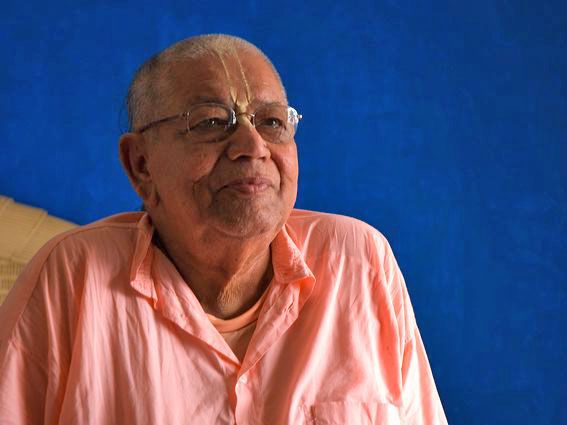The practice of Bhagavat-dharma explained.
By Srila Bhakti Sundar Govinda Dev-Goswami Maharaj
It is necessary to be qualified, and quality will come through surrender. Prabhupad Saraswati Thakur told Srila Guru Maharaj: “You don’t worry. You are a surrendered soul; you are surrendered to Krishna. You have no offence.”
Bhagavat-dharma is not such a narrow gauge. It is a broad gauge, a wide elevator.
ye vai bhagavata prokta upaya hy atma-labdhaye
anjah pumsam avidusam viddhi bhagavatan hi tan
(Srimad Bhagavatam: 11.2.34)
[“Know Bhagavat-dharma to be the means explained by the Lord for even the ignorant to easily attain the Lord.”]
If Krishna Himself says, “I like samosas and rasa-gullas”, then there is no problem. If you give Him a samosa and a rasa-gulla, He will be very satisfied. If you give Him anything else, He not will be satisfied. Whatever Bhagavan Krishna says is the way to get His mercy, that is Bhagavat-dharma.
And another verse makes this point even stronger:
yan asthaya naro rajan na pramadyeta karhichit
dhavan nimilya va netre na skhalen na pated iha
(Srimad Bhagavatam: 11.2.35)
[“One who follows this path is never impeded. Even if one runs with one’s eyes closed, one will not trip or fall.”]
“You can go straight, and no problem will come to you if you are fully surrendered to Lord Krishna and you have a mood of service to Lord Krishna. It does not matter whether you proceed with your eyes open or closed. If you proceed in the way of Bhagavat-dharma, you will reach your destination, the place you desire in the transcendental world.”
Here I displayed this verse:
jnane prayasam udapasya namanta eva jivanti
(Srimad Bhagavatam 10.14.3)
Sriman Mahaprabhu accepted it, and it explains the first quality, the minimum qualification, that is necessary, not the highest quality. What is that minimum? Throw away your knowledge and live surrendered to the sadhus. Where? Sthane sthitah: anywhere. “O Lord, You are ajita; no one can control or defeat You, but by the devotion of this kind of devotee You happily give Your mercy and become defeated. Ajito ’pi jita: no one can defeat You, but by this kind of devotion, a devotee can defeat You, and You become most merciful to them.
kayena vacha manasendriyair va
buddhyatmana vanusrta-svabhavat
karoti yad yat sakalam parasmai
narayanayeti samarpayet tat
(Srimad Bhagavatam: 11.2.36)
It is necessary to offer everything to Krishna and live on His remnants. Then no problems will come to us. In this regard, this is one kind of rule and regulation:
anukulyasya sankalpah pratikulyasya varjanam
raksisyatiti visvaso goptrtve varanam tatha
(Sri Satvata-tantra: 73)
You should try to eat the kind of prasadam that is favourable to your health. You should not disturb Krishna or disturb the devotees. This is procedure Srila Rupa Goswami Prabhu has given to us. Anukulyasya sankalpah: try to take the kind of prasadam that is favourable to your health.
Three kinds of devotees are identified in Bhagavatam:
sarva-bhutesu yah pasyed bhagavad-bhavam atmanah
bhutani bhagavaty atmany esa bhagavatottamah
(Srimad Bhagavatam: 11.2.45)
One who sees Krishna’s presence everywhere is a first class devotee.
isvare tad-adhinesu balisesu dvisatsu cha
prema-maitri-krpopeksa yah karoti sa madhyamah
(Srimad Bhagavatam: 11.2.46)
A second class devotee has Isvare prema, Tad-adhinesu maitri, balisesu krpa, and dvisatsu cha upeksa [love for the Lord, friendship with His servants, mercy for the innocent, and disregard for the inimical]. One who properly engages in these four kinds of behaviour is a second grade devotee.
archayam eva haraye pujam yah sraddhayehate
na tad-bhaktesu chanyesu sa bhaktah prakrtah smrtah
(Srimad Bhagavatam: 11.2.47)
[“One who faithfully worships the Deity of the Lord but not His devotees or other souls is a neophyte devotee.”]
Here the third grade devotee is described. It is necessary to explain these definitions widely. Then, you will understand more. Actually though, wherever we are giving discourses, there Srimad Bhagavat is present, Srimad Bhagavad-gita is present, and our Guru-varga is present. Not only the Bhagavat and the Gita are present there, the sadhu and Guru are also present.
Their influence must always be present in the life of a devotee. Then no problem will come. Whether or not you read the Bhagavat or not is not the question. If you get a good devotee’s association, a good Guru’s association, a good Vaisnava’s association, then always you will be benefitted. But it is necessary to be clean and clear. It cannot be appropriate for spiritual life that everything around us is dirty. Be clean and quiet. I am very happy to see that all our devotees are very cleanly and quietly practising. But an even more attentive nature and spirit are necessary for everyone. More. And more. And not ‘until’ a certain stage. That is necessary forever: be clean and clear, and serve with pure devotion.
Pure devotion has two definitions, one given by Srila Rupa Goswami, and one given by Sri Narad Goswami.
sarvopadhi-vinirmuktam tat-paratvena nirmalam
hrsikena hrsikesa-sevanam bhaktir uchyate
(Sri Narada-pancharatra)
[“Devotion is said to be service to the master of the senses with all the senses that is completely free from all adjuncts, intent upon Him, and uncontaminated.”]
This is given by Narad Goswami.
anyabhilasita-sunyam jnana-karmady-anavrtam
anukulyena krsnanusilanam bhaktir uttama
(Sri Bhakti-rasamrta-sindhu: Purva-vibhaga, 1.11)
[“Pure devotion is constant endeavour to please Krishna that is free from ulterior motives and unobstructed by pious action and renunciation.”]
This is given by Rupa Goswami.
In Bengali poetry, Prabhupad Srila Saraswati Thakur also wrote,
asakti-rahita sambandha-sahita
visaya-samuha sakali madhava
sri-hari-sevaya yaha anukula
visaya baliya tyage haya bhula
[“Be free from attachment and connect everything with Krishna. All material objects belong to the Lord. To consider anything that is favourable to the service of the Lord mundane and reject it is a mistake.”]
Source
Spoken on 13 April 2007.









